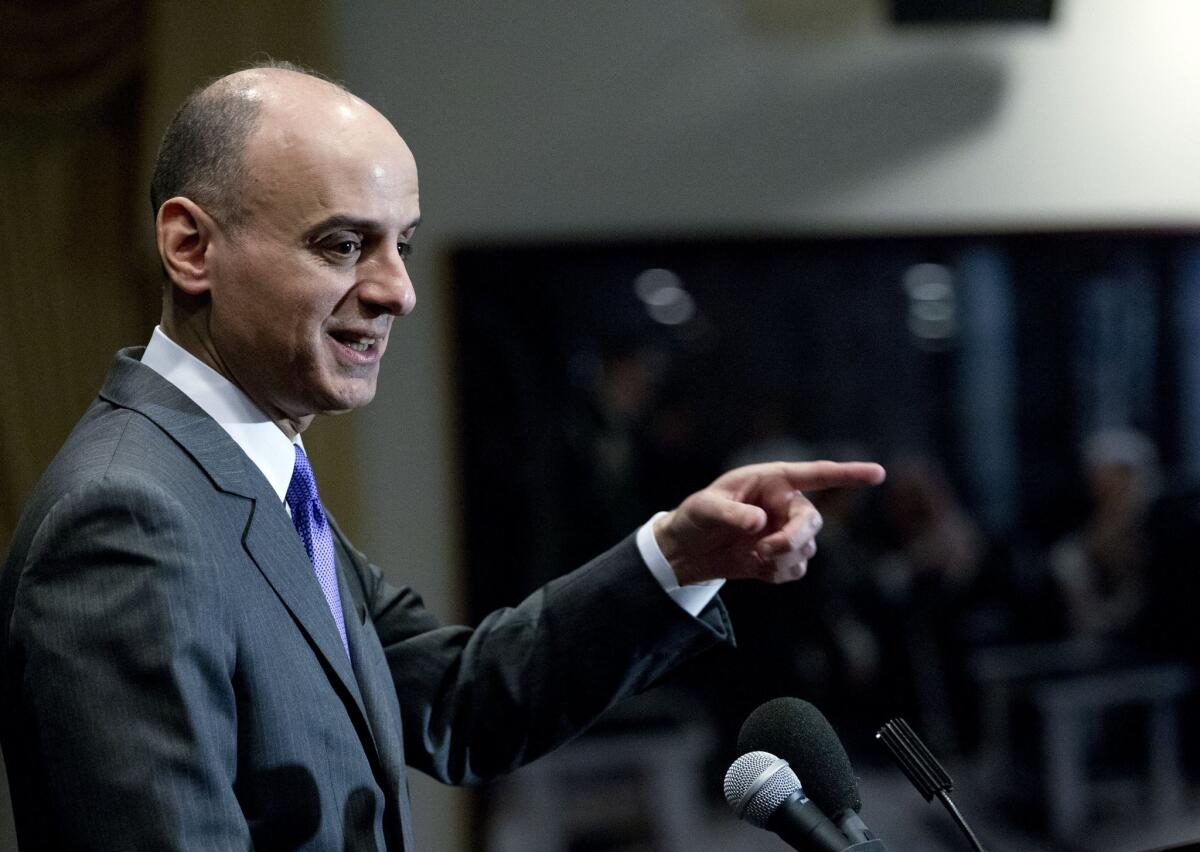Saudi Arabia’s ambassador rejects Iran’s call for cease-fire in Yemen

- Share via
Reporting from Washington — Saudi Arabia’s envoy in Washington rejected Iranian calls for a cease-fire in Yemen, saying Tehran should have no role in political negotiations in the war-torn country.
Saudi-led airstrikes will continue in Yemen until rebel Houthi militants disarm and agree to restore exiled President Abdu Rabu Mansour Hadi, Adel Jubeir, the Saudi ambassador to the United States, told reporters Wednesday.
“Iran has no role to play in Yemen,” Jubeir said. “Iran, last time I checked, does not have a border with Yemen.”
The Sunni Muslim kingdom of Saudi Arabia, which is Shiite Iran’s regional rival, shares a rugged 1,000-mile-long land border with Yemen.
On Tuesday, Iranian Foreign Minister Mohammad Javad Zarif had proposed a cease-fire to be followed by Iranian-backed negotiations to form a new government in Sana, the capital.
Fighters aligned with the Houthis, a Shiite minority group from northern Yemen, seized control of Sana last fall. They now control much of the country’s west and north, and in recent weeks have pushed south to Aden, the country’s major seaport, forcing the U.S.-backed president to flee.
The Obama administration has said Tehran has provided weapons, training and military advisors to the Houthis, although they are not considered under Iranian control.
A coalition of Sunni Arab nations led by Saudi Arabia, and supported by the United States, entered the war on March 25 with airstrikes and a naval blockade aimed at reversing the Houthis’ gains and restoring Hadi to power.
Analysts say the war appears at an impasse, with rebel fighters dug in or hiding in urban areas, while forces loyal to Hadi’s government are largely on the defensive.
Jubeir said Wednesday that Operation Decisive Storm has destroyed “much of the military infrastructure” of the militants and pushed them out of parts of Aden.
The warplanes also have targeted military brigades that defected from Hadi’s security forces and are loyal to his predecessor, Ali Abdullah Saleh, who was deposed in 2012.
The airstrikes have destroyed key stores of ballistic missiles, helicopters and communications networks, Jubeir said.
The Saudis have not targeted schools and hospitals, he said, but rebel forces have “been hiding in civilian areas, making it difficult to go after them.”
The United Nations high commissioner for human rights, Zeid Raad Hussein, said this week that at least 364 civilians have lost their lives since the airstrikes began, and 681 have been injured. Dozens of public buildings, including hospitals, schools, airports and mosques have been destroyed in airstrikes, shelling and other attacks, he said.
U.S. diplomats and special forces troops withdrew from Yemen in recent weeks as the fighting intensified, but officials said counter-terrorism operations against Al Qaeda in the Arabian Peninsula would continue. A drone strike in Yemen this week reportedly killed a senior cleric of the terrorist group.
A U.N. Security Council resolution approved Tuesday warned of a “significant and rapidly deteriorating” humanitarian crisis in Yemen and imposed an arms embargo intended to block shipments of weapons going to the Houthi militias. The rebels denounced the vote as supporting “aggression.”
The U.N. resolution also calls on the Houthis to withdraw from areas they have seized, including Sana. About 14 countries voted to pass the resolution while one, Russia, abstained.
Follow me @ByBrianBennett.
More to Read
Sign up for Essential California
The most important California stories and recommendations in your inbox every morning.
You may occasionally receive promotional content from the Los Angeles Times.










